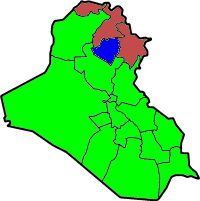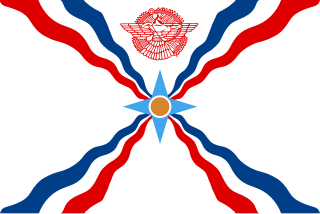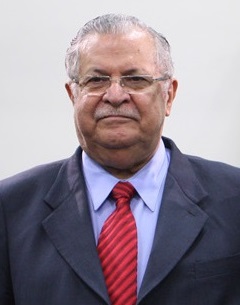The politics of Iraq take place in a framework of a federal parliamentary representative democratic republic. It is a multi-party system whereby the executive power is exercised by the Prime Minister of the Council of Ministers as the head of government, as well as the President of Iraq, and legislative power is vested in the Council of Representatives and the Federation Council.

Kirkuk is a city in Iraq, serving as the capital of the Kirkuk Governorate, located 238 kilometres north of Baghdad. Kirkuk lies in a wide zone with an enormously diverse population and has been multilingual for centuries. There were dramatic demographic changes during Kirkuk's urbanization in the twentieth century, which saw the development of distinct ethnic groups. Kurds, Iraqi Turkmen, Arabs, and Assyrians lay conflicting claims to this zone, and all have their historical accounts and memories to buttress their claims.

Kirkuk Governorate or Kirkuk Province is a governorate in northern Iraq. The governorate has an area of 9,679 square kilometres (3,737 sq mi). In 2017 the estimated population was 1,259,561 people. The provincial capital is the city of Kirkuk. It is divided into four districts.

The Kurdistan Regional Government (KRG) is the official ruling body of the autonomous Iraqi Kurdistan region.

The Council of Representatives is the unicameral legislature of the Republic of Iraq. It is currently composed of 329 seats and meets in Baghdad inside the Green Zone.
The first government of Iraq led by Nouri al-Maliki took office on May 20, 2006 following approval by the members of the Iraqi National Assembly. This followed the general election in December 2005. The government succeeded the Iraqi Transitional Government which had continued in office in a caretaker capacity until the new government was formed and confirmed.
The government of Iraq has established a committee to consider a proposed amendment to the Constitution of Iraq.

The Kirkuk status referendum was the Kirkuk part of a planned plebiscite to decide whether the disputed territories of Northern Iraq should become part of the Iraqi Kurdistan region. The referendum was initially planned for 15 November 2007, but was repeatedly delayed and ultimately never took place.

The Kurdistan Parliament, also called the Iraqi Kurdistan Parliament (IKP), is the parliament of Iraqi Kurdistan. It is made up of representatives from the various parties, lists or slates that are elected every four years by the inhabitants of the provinces of Iraqi Kurdistan currently governed by the Kurdistan Regional Government. Prior to the Kurdistan Election Law passed in March 2009, the body was referred to as the Kurdistan National Assembly.

A parliamentary election was held in Iraq on 7 March 2010. The election decided the 325 members of the Council of Representatives of Iraq who would elect the Iraqi prime minister and president. The election resulted in a partial victory for the Iraqi National Movement, led by former Interim Prime Minister Ayad Allawi, which won a total of 91 seats, making it the largest alliance in the Council. The State of Law Coalition, led by incumbent Prime Minister Nouri Al-Maliki, was the second largest grouping with 89 seats.

Turkmeneli, also known as Turkmenland, and historically as Turcomania, is a political term used by the Iraqi Turkmen/Turkoman minority in Iraq to define the vast swath of territory in which they have historically had a dominant population. The term incorporates the Iraqi Turkmen/Turkoman homelands running from Iraq's border with Turkey and Syria and diagonally down the country to the border with Iran.

The Nineveh Governorate election of 2009 was held on 31 January 2009 alongside elections for all other governorates outside Iraqi Kurdistan and Kirkuk.
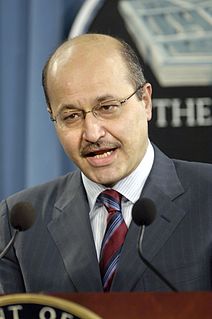
The Iraqi Kurdistan legislative elections of 2009 took place on 25 July 2009. A total of 2.5 million citizens of Iraqi Kurdistan were eligible to vote for the parliamentary and presidential elections. People currently living outside Iraqi Kurdistan were not allowed to vote. The elections followed the Iraqi Kurdistan elections of 2005. The parliamentary elections coincided with the direct election of the President of Kurdistan. Unlike the Iraqi Kurdistan elections of 2005, the president of Kurdistan was to be chosen directly through popular votes. A referendum to approve the constitution of Iraqi Kurdistan originally planned for the same day was put back to 1 August.

Governorate or provincial elections were held in Iraq on 20 April 2013, to replace the local councils in the governorates of Iraq that were elected in the Iraqi governorate elections of 2009. Elections took place in 12 of Iraq's 18 governorates. Elections didn't take place in the 3 governorates forming the Kurdistan Region or Kirkuk, Anbar, or Ninevah, meaning that a total of 378 provincial council seats were up for election.
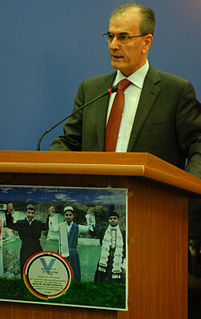
Dr. Najmiddin Karim, born 1949, also known as Najmaldin Karim, is the governor of Kirkuk Governorate of Iraq. Prior to the invasion of Iraq, Karim had served in numerous Kurdish and Iraqi opposition groups.

The 2013 Nineveh Governorate election in Iraq was held on 20 June with elections for the Al Anbar Governorate. Due to security problems, turnout was less than half that of the 2009 election. This election saw Sunni Arab parties lose a number of seats to minority parties.
The Ba'athist Arabization campaigns in North Iraq involved the forced displacement and cultural Arabization of minorities, in line with settler colonialist policies, led by the Ba'athist government of Iraq from the 1960s to the early 2000s, in order to shift the demographics of North Iraq towards Arab domination. The Iraqi Ba'ath party, first under Ahmed Hassan al-Bakr, and later Saddam Hussein, engaged in active expulsion of minorities from the mid-1970s onwards. In 1978 and 1979, 600 Kurdish villages were burned down and around 200,000 Kurds were deported to the other parts of the country.

Parliamentary elections were held in Iraq on 12 May 2018. The elections decided the 329 members of the Council of Representatives, the country's unicameral legislature, who in turn will elect the Iraqi President and Prime Minister. The Iraqi parliament ordered a manual recount of the results on 6 June 2018. On 10 June 2018, a storage site housing roughly half of the ballots from the May parliamentary election caught fire.
